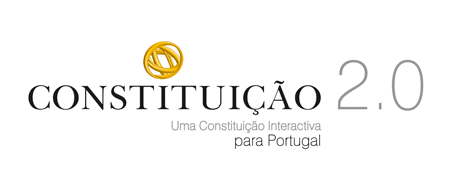
While the Web is upgrading to version 3.0, e-governance seems to be trapped in an eternal beta phase. A seemingly simple step like using electronic voting stations is still considered a great success wherever applied. But even more common are decisions to simply leave elections analog and offline.
But if you cannot bring the government to the people, you might bring the people to the government. An interesting initiative to bring governance and online technology together was launched in Portugal in July. The Institute for Portuguese Democracy (IDP), a Lisbon-based political, nonpartisan think tank has opened a website that allows users to use a wiki to draft the country’s constitution as easy as an article on Wikipedia.
The project, named Constituição 2.0, aims to shake people from “indifference and lack of involvement in the political process, brought on by distrust of politicians”, as IDP’s internet strategist Leonardo de Melo Goncalves explains. More than one month into the project, only a few web-users have used their chance to pass “amendments”, in spite of the projects presence on Youtube, Facebook and Twitter. In fact, only 23 users have registered and added their suggestions to the project. People’s absence on summer breaks could be one explanation, but a more plausible one is connected to a conscious decision by the Institute. Aiming for a general make-over of the detailed and outdated current constitution, they opted to start from scratch by simply opening an empty document. I wonder whether Portuguese voters’ indifference has gone so far that they will not even draft a constitution from their living room or whether the (almost) empty sheet might simply overwhelm them.
The initiative has received only little echo on the Web, probably because the website is available in Portuguese only. However, an article in Ha’aretz has examined the possibility of copying the scheme in Israel. In that case, there would be little alternatives other than starting from scratch. Israel has no formal constitution to this date, but suffers from the same distrust of politicians reported in Portugal. Fearing strident views would drive out more patient and constructive efforts to achieve a consensus, one talkbacker suggested the probably more feasible method of having an “expert-Wiki” open for outside comments.
It seems that drafting a complete online constitution is simply too big a challenge for the current capabilities of e-governance.


3 replies on “Amend the Constitution from Your Living Room”
When the Swiss constitution was amended in the 1990ies, the government launched a “people’s discussion” to debate constitutional provisions. In relation to the preamble, which was drafted by a Swiss novelist, the government received comments from about 100 political organizations and 6,400 individuals.
it could simply be that a document such as this should receive a better forum for editing than a wiki page? A constitution is a pretty important thing, and if anyone can go online, register and start suggesting changes to it. It almost belittles it.
The Swiss government invited its citizens to contribute to the drafting of a security white paper earlier this year.